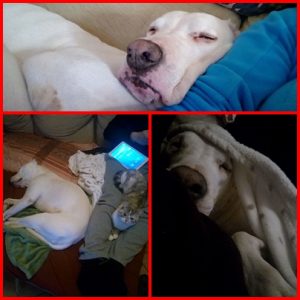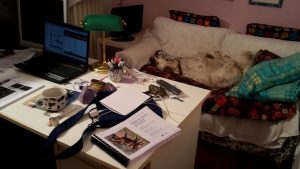Let the Sleeping Dog Lie!

Honestly today I was going to write on a totally different topic, but a friend made me change my plans. Because… she was sort of “scolded” for publishing too many pictures of her dog, a macho style Dogo Argentino, sleeping. I admit I like doing the same and we are not alone, many people suffer from the same addiction. But why do we like so much to steal a picture of ours dogs sleeping? I have always done this, prior to the advent of digital cameras, and now it is even easier, all you need is a cell phone and a cautious approach to the victim.
Our hobby is certainly fueled by the fact that sleeping dogs are super cute but I think there are also some deeper motivations. I am fascinated by the human-animal bond and I believe that a dog who sleeps deeply in our presence expresses quite a degree of trust. Think about prey animals, horses can lie down or fall asleep while standing, relaxing one leg at the time. Newborn foals and calves can immediately stand on their hooves because nature knows a predator might come. Dogs, obviously, are not preys but whether they came from village dogs (Dogs: A New Understanding of Canine Origin, Behavior and Evolution by Raymond Coppinger (2002-10-01)
or directly descended from wolves, equally had to face certain dangers through their evolution and, unfortunately, many modern dogs still do. Pet animals, despite being pets, still have a deeper connection to wilderness than the average – there are exceptions – human being. This connection makes most of the them more alert and more aware of their surroundings.

Not all the breeds, and not all the dogs, are the same, some are naturally more alert, I think neoteny plays a role. Some dogs wake up at the slightest noise and some, especially those who had experienced traumas, seem unable to fully relax when humans are around. Briony, for instance, despite a very smooth transaction from her place of birth to my house, needed several months to properly sleep in my presence. Yes, she was sleeping but mostly curled up and ready to punch on her feet at any forms of danger. The “nutshell” position was her only alternative, this is the most defensive option. It involves tucking the paws under themselves, placing the head into their body and their tail around their face. This is not a very restful sleep as dogs are tensing most of their body so as not to be vulnerable.
I have to admit that dogs tend to resemble their people: I wake up at the slightest noise and have troubles falling asleep in new places. I envy all those people who can fall asleep everywhere, on the train, flying in an airplane, in the doctors’s waiting room and more they probably rely on someone like me to wake them up in case of fire.
But anyway, it feels really good seeing your “new” dog increasingly relaxing, literally spreading himself on any resting surfaces. His posture becoming less and less stiff, and his body getting longer and longer. Briony now rests on her sides, on her back, with her legs stretched out and tends to occupy quite a wide area! Her evolution is certainly not unique, I think that most of our dogs went this way. A dog sleeping well is a matter of trust, I guess this is why we love it so much!